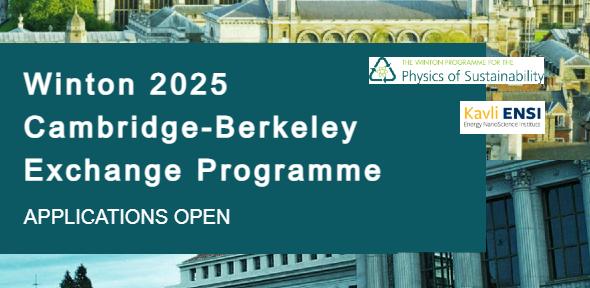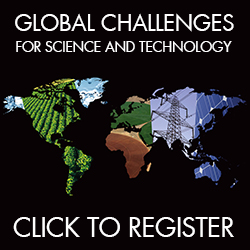
Applications for Exchange Awards are open as of 1 October 2024, and will close on Friday 13 December 2024.
The Winton Cambridge-Berkeley Exchange Programme is a partnership between the Winton Programme for the Physics of Sustainability, and the Kavli Energy NanoScience Institute (ENSI) at the University of California, Berkeley to support research within the fields of these two programmes.
This programme supports exchanges for PhD students and postdoctoral researchers in both directions, between research groups involved in the Winton Programme and KavliENSI on topics relating to the physics of sustainability.
Applications for 2025 exchange visits will open on the 1 October 2024, and will close on Friday 13 December 2024.
All applications will be reviewed by a Review Panel comprised of senior faculty from both Berkeley and Cambridge. Applicants will be notified of acceptance in January 2025.
Winton Graduate Exchange Scholars
Students can submit proposals for projects of between six weeks (e.g. for a summer exchange) and six months in length, to enhance their PhD research projects by conducting new experiments at the host university. To be eligible to apply, students must be registered on a PhD programme at their home university for the duration of the visit, and must obtain approval from their home and host supervisors for the exchange visit.
Click here for a list of Faculty members at the Cavendish Laboratory.
Click here for a list of Faculty members at Kavli ENSI.
Financial support will be provided to meet economy return airfares, visa costs, accommodation and medical insurance. In addition, research support funds will be provided to the group of the host supervisor to facilitate the research of the PhD student.
Please download and complete the graduate exchange application form 2025 and submit to the Winton Programme (email energy@admin.cam.ac.uk). Awards will be made subject to candidates being able to meet institutional and visa requirements.
Examples of a student exchange: visit of Mustafa Caglar between Keyser Group in Cambridge and the Zettl Group at UC Berkeley
The application deadline has now passed.
Winton Postdoctoral Exchange Fellows
Postdoctoral researchers can apply for visits of up to six months to continue their research, or develop new areas of research within the remit of the Winton and ENSI programmes. To be eligible applicants must be currently based at the home university and obtain approval from their home and host supervisors for the exchange visit.
Financial support will be provided to meet economy return airfares, visa costs, accommodation and medical insurance. In addition, research support funds will be provided to the group of the host supervisor to facilitate the research of the postdoctoral researcher.
Please download and complete the postdoctoral exchange application form 2025 and submit to the Winton Programme (email energy@admin.cam.ac.uk).
Awards will be made subject to candidates being able to meet institutional and visa requirements.
Example of postdoctoral exchange: visit of Dr Hannah Stern between Rao Group in Cambridge and the Ginsberg Group at UC Berkeley
The application deadline has now passed.



